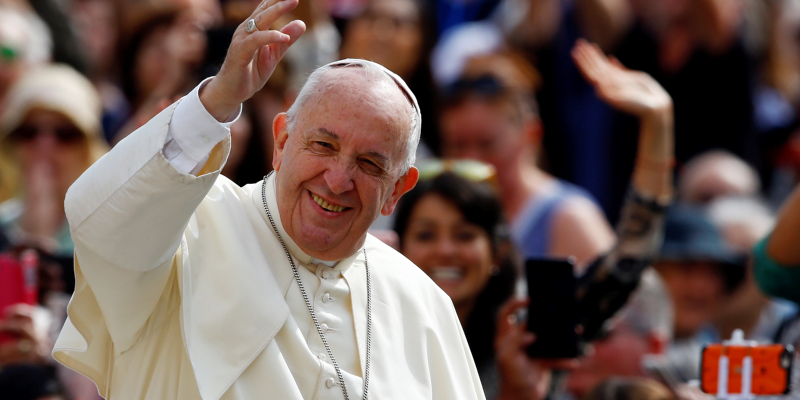On April 9, Pope Francis' new apostolic exhortation on holiness in today's world was made public. Gaudete et exsultate. The Bishop of Vitoria presented it, emphasizing that it is a reference for Christian life and pastoral action.
Juan Carlos Elizalde - Bishop of Vitoria
Heart and freshness ooze from this simple apostolic exhortation of Pope Francis, making a universal call to holiness. Holiness for all God's people, holiness "next door," "the middle class of holiness" (n. 7).
But at the same time a demanding, fulfilling holiness, which can free us from "a mediocre, watered-down, liquefied existence" (1). We walk accompanied, supported and guided by the company of all the saints (4). In each saint, God speaks a word to the world (22). "You also need to conceive of your whole life as a mission." (23), and the conclusion is not long in coming: "May you be able to recognize the word, the message of Jesus that God wants to tell the world with your life." (24).
There are two falsifications of holiness. One is to conceive it as an abstract wisdom, theoretical and without concreteness: "I am not a saint.A God without Christ, a Christ without the Church, a Church without the people" (37); and the other, a holiness only in our own strength: "There are still Christians who insist on following another path: that of justification by one's own strength, that of the adoration of human will and one's own capacity, which translates into an egocentric and elitist self-indulgence deprived of true love." (57).
The heart of the document is the discourse of the Beatitudes, "the Christian's identity card". "In them is drawn the face of the Master, which we are called to make transparent in our daily lives." (63). And the "great protocol"by which we are to be judged, mercy: "For I was hungry and you gave me food, I was thirsty and you gave me drink, I was a stranger and you welcomed me, naked and you clothed me, sick and you visited me, in prison and you came to see me."(Mt 25:35-36). It is a harmful error to dissociate charitable action from a personal relationship with the Lord, since it turns the Church into an NGO (100). But it is also an ideological error to be systematically suspicious of the social commitment of others, "..." (100).considering it as something superficial, mundane, secularist, immanentist, communist, populist, etc." (101). And the Pope concretizes this tension in the Church. "The defense of the innocent unborn, for example, must be clear, firm and passionate, because the dignity of human life, always sacred, is at stake here, and love for each person beyond his or her development demands it. But equally sacred is the life of the poor who have already been born, who are struggling in misery [...] and in every form of discarded life." (101). Migration is no less important than bioethics (102).
The notes of holiness in today's world are particularly concrete and suggestive. Contemplating the first Christian community of Jerusalem during this Easter season, we can see some attitudes that accompany the holiness that the Pope proposes. Endurance, patience and meekness are the first notes. They resist persecution with hope. They return good for evil. "Christians can also be part of networks of verbal violence through the Internet and various forums or digital exchange spaces."(115), the Pope warns. Joy and a sense of humor are also prominent notes, a thermometer of the hope that the Church spreads. "Boldness, enthusiasm, speaking freely, apostolic fervor, all these are included in the word parresia, a word with which the Bible also expresses the freedom of an existence that is open, because it is available to God and to others." (129). These attitudes always take place in community. The last note of holiness is constant prayer: "..." (129).The saint is a person with a prayerful spirit, who needs to communicate with God. He is someone who cannot bear to suffocate in the closed immanence of this world, and in the midst of his efforts and dedication he sighs for God, goes out of himself in praise and expands his limits in the contemplation of the Lord. I do not believe in sanctity without prayer, even if it does not necessarily involve long moments or intense feelings." (147).
The last chapter of the exhortation dedicates the Pope to combat, vigilance and discernment. We cannot be naive because the devil "let us not think that it is a myth, a representation, a symbol, a figure or an idea. This deception leads us to lower our arms, to neglect ourselves and become more exposed. He does not need to possess us. He poisons us with hatred, with sadness, with envy, with vices. And so, while we let our guard down, he takes advantage of it to destroy our lives, our families and our communities, because like a roaring lion, prowling about, seeking whom it may devour' (1 Pet 5:8)" (161). From Mary's hand we can give the best response at every moment. Her closeness is a guarantee of our holiness.I want Mary to crown these reflections, because she lived the beatitudes of Jesus like no one else. She is the one who trembled with joy in the presence of God, who kept everything in her heart and let herself be pierced by the sword. She is the saint among the saints, the most blessed, the one who teaches us the way of holiness and accompanies us." (176).
Thank you, Pope Francis, for offering a horizon for Christian life and a starting point for pastoral action.








